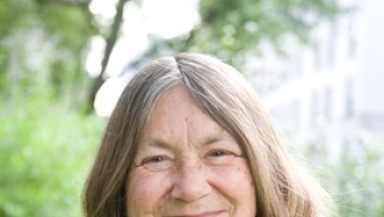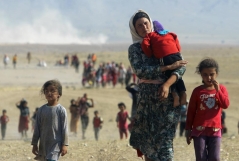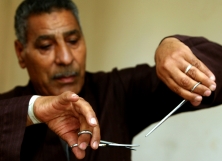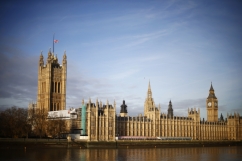Elaine Storkey visited the eastern provinces of the Democratic Republic of Congo (DRC) in 2005. She is the president of Tearfund and met senior military officers there who wanted to thank her for the work the organisation had done. They were cheerfully generous in their praise.
The atmosphere changed as soon as she raised the issue of sexual violence. They looked annoyed, grim-faced and offended. Her question met instant repudiation. There was no violence against women, they assured her. She'd been misled. Women were lying to her in order to get sympathy and money.
She's been involved before with organisations helping women who'd been abused, she tells Christian Today (she is a founder member of Restored), but that was the first time she had been face to face with this level of violence. "It shocked me," she says.
In fact, the DRC is well known to be the rape capital of the world. Around 200,000 rape victims are alive today, though the number of those raped and then killed, or who have died from their injuries, will never be known.
Through her patient presentation of evidence, Storkey was able to extract some acknowledgment of the issue from those officers. Since then, under UN pressure, the DRC has taken some small steps to address it and there have even been a few convictions.

Her experience there, however, made her very angry. She realised that "this was just one aspect of violence against women – the tip of the iceberg" – and it set her off on a journey which has resulted in the forthcoming publication of Scars Across Humanity: Understanding and overcoming violence against women (SPCK, £9.99).
It's taken the theologian and sociologist 10 years to write and it's not an easy read – in fact its graphic accounts of what men do to women is often horrifying. Its chapters deal with female genital mutilation, so-called 'honour killings' – the title is rightly repudiated – violence in the home, prostitution, rape and war.
During her research she engaged deeply with questions about what lies behind violence against women. It is patriarchy, the assumption that men have rights over women based purely on their gender, but beneath that there is something else: it is a manifestation of sin. "If you break sin down, it is about alienation from God and from other people," she says. And sin "embeds itself in social structures. A whole structure can be built on a lie against humanity."
We probably think we know about violence against women, but as I read her book, I began to question that. The scale of female abortion and infanticide in India, for instance, is staggering – Storkey quotes one source that suggests as many as 25 million women could have been alive today and are "missing". One lucky one is the baby whose hand was seen poking out of the ground by a farmer: she was buried alive at two days old, but survived.
And while we might know in general terms that bad things happen, it takes a story to make us understand it. Storkey tells of the appalling suffering of child brides like Elham Assi, who was 13 when she was married to a 23-year-old man in Yemen. She bled to death having suffered extensive tearing around the vagina and rectum. There are other stories, some of girls even younger.
In some cultures, honour killings and assaults are common. In Pakistan, Zahida Perveen was blinded and her nose and ears cut off by her husband, who thought she had a 'bad character'. In Turkey, 16-year-old Medine Memi was buried alive by relatives for talking to boys.
Domestic violence is another theme. Again, it seems to be universal. And, Storkey writes, "The majority of perpetrators are not, in fact, men out of control, but are very much in control. They know exactly how to hurt their victim, how to inflict the maximum pain without detection."
War and violence
War and sexual violence also gets a chapter. Again, there are the stories and the statistics. We know about the genocide in Rwanda. What is less spoken of is that in those 100 days, between quarter and half a million women and girls were raped. In the Bosnian war it was up to 50,000, in Liberia about 49 per cent of the whole female population aged between 15 and 70. Rape is used not just to satisfy desire but as a tactic to destroy communities. Women are deliberately raped in front of their husbands, with terrible psychological and social consequences.
These stories are hard to read and hard to write about. What's also deeply depressing is the degree of social acceptance that violence against women still commands. A 2013 study among students at Amman University in Jordan found that a third of the teenagers – half of the boys and one in five of the girls – believed that killing a daughter, sister or wife who had 'shamed' the family was right.
However, Storkey does not simply tell horror stories. She also tries to understand what's happening. She examines – and comprehensively dismisses – theories that gender-based violence is just 'in our genes', and happens because it brings some sort of evolutionary advantage to the men who carry it out. It's far more true, she believes, that women are targeted because they are likely to be more vulnerable – they are abused because it's easier. She engages with power relationships and the deeply entrenched structural inequalities between the sexes. Patriarchy, she says, is "pathological": "If women and men are ever to flourish in a context of mutual free, justice and empowerment we must travel beyond patriarchy into a new social order."
However, she's clear that "we are responsible". "Patriarchal structures are a product of human choice and attitudes; oppression and brutality are rooted in the power sin exercises in human communities. A Christian theology of sin places accountability for attitudes, culture, and actions firmly on human shoulders; we have to own what we create."
Hope for change
But is there really any hope for change? "I do feel hopeful. The UN, for all its faults, does a good job in raising the issue of gender awareness. Countries that haven't got a long legal history have UN on their backs all the time saying, 'Implement this protocol'.
"Things are changing, in pockets, and there is a lot more noise about it."
However, she says: "In the book my aim is to galvanise Christians first and foremost. We can try to encourage people of other faiths to stand together on this rather than just squabbling among ourselves. We've got a lot to say to each other from a basis of faith. And then to go beyond the churches and to engage with anybody, because this is a humanitarian project and we've all got to be involved.
"I'm wanting the whole sweep of it to be seen in its horror, to galvanise public opinion if I possibly can – but also I want a Christian voice to be heard."
Among other things, that voice will say that violence against women is not any part of true religion at all: "It's an aberration, and the Christian gospel offers a very different redemptive way forward."
In the concluding words of her book: "Ending the violence is urgent. The scars across humanity are deep. It's time to join the healing and the work of restorative justice."
Follow @RevMarkWoods on Twitter.


















